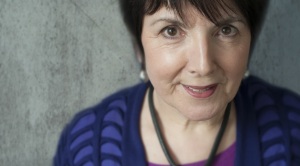Le Gordon Wells
 Angus MacPhail from Clachan in North Uist is another well-known member of the community who kindly agreed to contribute to the Stòras Beò nan Gàidheal project, often seen on stage in local drama productions, as well as working hard behind the scenes. Here, he talks to Archie Campbell.
Angus MacPhail from Clachan in North Uist is another well-known member of the community who kindly agreed to contribute to the Stòras Beò nan Gàidheal project, often seen on stage in local drama productions, as well as working hard behind the scenes. Here, he talks to Archie Campbell.
In the first part of the conversation he reveals his Boreray ancestry, and talks about his schooling in both North and South Uist before finishing in Inverness, with impressions of hostel life and being regarded as a “teuchter” in the town. Studying Civil Engineering in Aberdeen, he shared lodgings with other islanders, and was involved in inter-university competitions in shinty and through the pipe-band. Work took him to Inverawe first, followed by London (where he met his Irish wife), and then back to Scotland. Always keeping in touch with fellow Gaels, when they moved to Loch Broom they got involved with An Comunn Gàidhealach, and he also volunteered with the Mountain Rescue team.
A Clilstore transcript is available here: http://multidict.net/cs/8247
In the second part, Angus talks about their life for 7 years around Applecross and the north-west, with his wife being a district nurse and also doing B&B, in an area where there was still some Gaelic spoken. They then moved back to Uist (via Lewis) when Comhairle nan Eilean Siar was formed. This was a busy time with lots of civil engineering work on roads and new developments. He talks about the development of the strong local Gaelic drama group, and plans for the local history society. Other interests include boating, and his garden – though this was mainly his wife’s work. He discusses the changes he’s seen in Carinish, and his international links through family in Australia and Ireland.
A Clilstore transcript is available here: http://multidict.net/cs/8248
Tadhail air Island Voices – Guthan nan Eilean
Powered by WPeMatico

 Güney Uist adasında bulunan Daliburgh kasabasinda her sene düzenlenen, İskoç Galcesi ve Galik müziği eğitimi veren Ceòlas yaz okulu hakkında kısa bir belgesel.
Güney Uist adasında bulunan Daliburgh kasabasinda her sene düzenlenen, İskoç Galcesi ve Galik müziği eğitimi veren Ceòlas yaz okulu hakkında kısa bir belgesel. Another two-way conversation in the
Another two-way conversation in the 
 Visitors to the annual
Visitors to the annual  In amongst the valuable Gaelic social history,
In amongst the valuable Gaelic social history, 


 It’s April 2020 and the global lockdown continues, whether you’re on the West coast of Scotland or in West Bengal. We’re largely “confined to quarters” in the international bids to lessen the impact of the COVID-19 pandemic. The internet has many faults, but now offers the potential to afford mental release in times of physical restriction, at least to those fortunate to have access to it. Here’s an example.
It’s April 2020 and the global lockdown continues, whether you’re on the West coast of Scotland or in West Bengal. We’re largely “confined to quarters” in the international bids to lessen the impact of the COVID-19 pandemic. The internet has many faults, but now offers the potential to afford mental release in times of physical restriction, at least to those fortunate to have access to it. Here’s an example.